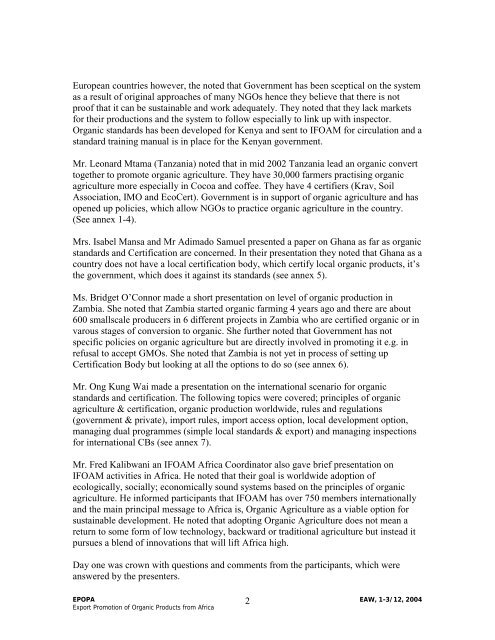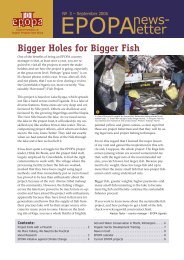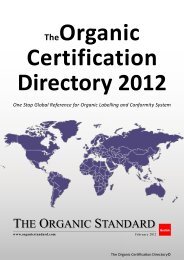PDF (50 kB) - Grolink
PDF (50 kB) - Grolink
PDF (50 kB) - Grolink
Create successful ePaper yourself
Turn your PDF publications into a flip-book with our unique Google optimized e-Paper software.
European countries however, the noted that Government has been sceptical on the system<br />
as a result of original approaches of many NGOs hence they believe that there is not<br />
proof that it can be sustainable and work adequately. They noted that they lack markets<br />
for their productions and the system to follow especially to link up with inspector.<br />
Organic standards has been developed for Kenya and sent to IFOAM for circulation and a<br />
standard training manual is in place for the Kenyan government.<br />
Mr. Leonard Mtama (Tanzania) noted that in mid 2002 Tanzania lead an organic convert<br />
together to promote organic agriculture. They have 30,000 farmers practising organic<br />
agriculture more especially in Cocoa and coffee. They have 4 certifiers (Krav, Soil<br />
Association, IMO and EcoCert). Government is in support of organic agriculture and has<br />
opened up policies, which allow NGOs to practice organic agriculture in the country.<br />
(See annex 1-4).<br />
Mrs. Isabel Mansa and Mr Adimado Samuel presented a paper on Ghana as far as organic<br />
standards and Certification are concerned. In their presentation they noted that Ghana as a<br />
country does not have a local certification body, which certify local organic products, it’s<br />
the government, which does it against its standards (see annex 5).<br />
Ms. Bridget O’Connor made a short presentation on level of organic production in<br />
Zambia. She noted that Zambia started organic farming 4 years ago and there are about<br />
600 smallscale producers in 6 different projects in Zambia who are certified organic or in<br />
varous stages of conversion to organic. She further noted that Government has not<br />
specific policies on organic agriculture but are directly involved in promoting it e.g. in<br />
refusal to accept GMOs. She noted that Zambia is not yet in process of setting up<br />
Certification Body but looking at all the options to do so (see annex 6).<br />
Mr. Ong Kung Wai made a presentation on the international scenario for organic<br />
standards and certification. The following topics were covered; principles of organic<br />
agriculture & certification, organic production worldwide, rules and regulations<br />
(government & private), import rules, import access option, local development option,<br />
managing dual programmes (simple local standards & export) and managing inspections<br />
for international CBs (see annex 7).<br />
Mr. Fred Kalibwani an IFOAM Africa Coordinator also gave brief presentation on<br />
IFOAM activities in Africa. He noted that their goal is worldwide adoption of<br />
ecologically, socially; economically sound systems based on the principles of organic<br />
agriculture. He informed participants that IFOAM has over 7<strong>50</strong> members internationally<br />
and the main principal message to Africa is, Organic Agriculture as a viable option for<br />
sustainable development. He noted that adopting Organic Agriculture does not mean a<br />
return to some form of low technology, backward or traditional agriculture but instead it<br />
pursues a blend of innovations that will lift Africa high.<br />
Day one was crown with questions and comments from the participants, which were<br />
answered by the presenters.<br />
EPOPA 2<br />
EAW, 1-3/12, 2004<br />
Export Promotion of Organic Products from Africa





